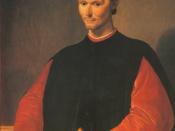" ...for how we live is so far removed from how we ought to live, that he who abandons what is done for what ought to be done, will rather learn to bring about his own ruin than his preservation".(Machiavelli 12) This is a quote from Machiavelli's "The Prince". This is only one belief of Machiavelli, which, many great leaders have been known to use. Have you ever thought about a leader that possessed these qualities that was from a play? Shakespeare's character Macbeth represents the Machiavellian idea that a ruler should appear well in public, be smart and strong, and do what is necessary to hold onto power. Shakespeare used imagery, and metaphors to portray Macbeth this way because, although he dies in the end, Macbeth still used Machiavelli's ideals, and was successful in many ways.
Both Machiavelli and Shakespeare knew that it matters how a leader portrays himself to the public.
Machiavelli thought that it was important for a leader to appear to be good in public, and hide his bad qualities from his people. "...he should seem to be all mercy, faith, integrity, humanity, and religion....Everybody sees what you appear to be, few feel what you are, and those few will not dare oppose themselves to the many...". (Machiavelli 15) Machiavelli used diction to portray what a leader should be like in the old ages, such as; having mercy, faith, and religion. He also says that you should at least pretend to show some of these qualities to your people. As Machiavelli writes, Macbeth talks about hiding his dark self to the world.
"MACBETH [aside]: The Prince of Cumberland-that is a step/ On which I
must fall down or else o'erleap/ For in my way it lies. Stars hide your fires...


